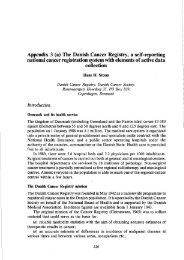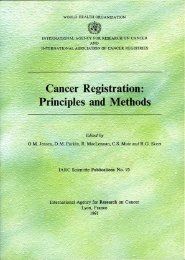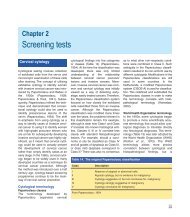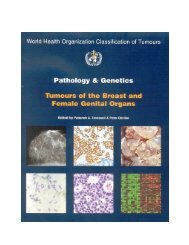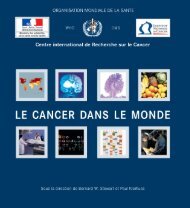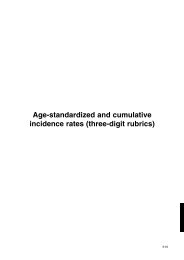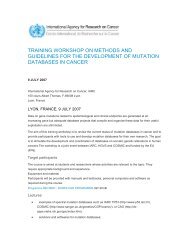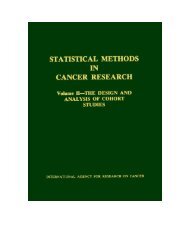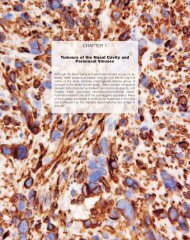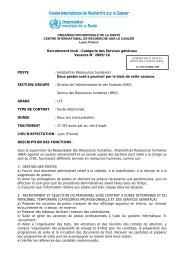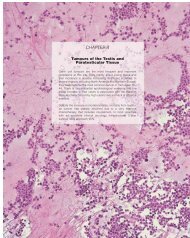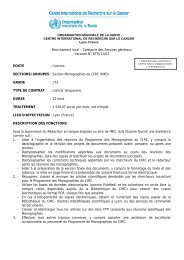world cancer report - iarc
world cancer report - iarc
world cancer report - iarc
You also want an ePaper? Increase the reach of your titles
YUMPU automatically turns print PDFs into web optimized ePapers that Google loves.
aspirin and other non-steroidal anti-inflammatory<br />
drugs should only be considered<br />
established if there are appropriate results<br />
from a randomized trial.<br />
Human intervention trials<br />
A number of studies have been performed<br />
in which the serum concentrations of<br />
β-carotene or dietary intake of<br />
Fig. 4.28 Mammogram showing the location of a<br />
tumour (T). Treatment of invasive breast <strong>cancer</strong><br />
with tamoxifen reduces the risk of a second<br />
tumour in the contralateral breast.<br />
Fig. 4.29 Histopathology of oral leukoplakia which<br />
has been assayed in <strong>cancer</strong> chemopreventive trials<br />
with retinoids (see Box: Precursor lesions in<br />
chemoprevention trials, p87).<br />
154 Prevention and screening<br />
T<br />
β-carotene were assessed in observational<br />
epidemiological studies in relation<br />
to <strong>cancer</strong> risk [17]. The results of these<br />
studies suggest that β-carotene has preventive<br />
effects against <strong>cancer</strong>s of the<br />
lung, oral cavity and pharynx. In order to<br />
confirm this interpretation, three large<br />
intervention trials were started in the<br />
1980s. Enthusiasm for use of β-carotene<br />
in chemoprevention was substantially<br />
dampened by the outcomes of these trials.<br />
In the two largest, β-carotene use<br />
significantly increased the risk for lung<br />
<strong>cancer</strong> among smokers and/or<br />
asbestos-exposed workers within three<br />
to six years after the start. The third<br />
trial, conducted among physicians in the<br />
USA who were primarily non-smokers,<br />
showed no increased risk for lung <strong>cancer</strong><br />
[18]. In one of the trials, α-tocopherol<br />
supplementation had no effect on<br />
the occurrence of lung <strong>cancer</strong> [19].<br />
A 32% reduction in the incidence of<br />
prostate <strong>cancer</strong> and a 41% reduction in<br />
deaths from this <strong>cancer</strong> were recorded<br />
among the smokers randomly assigned<br />
to a daily dose of α-tocopherol (vitamin<br />
E) in the Alpha-Tocopherol, Beta-<br />
Carotene Cancer Prevention Study.<br />
There was, however, a 50% increase in<br />
the occurrence of cerebral haemorrhage<br />
among those men taking vitamin E [19].<br />
Thus, before use of vitamin E can be<br />
recommended for the prevention of<br />
prostate <strong>cancer</strong>, another trial should be<br />
conducted in an independent setting,<br />
with careful attention to possible sideeffects.<br />
The chemoprevention of<br />
prostate <strong>cancer</strong> is otherwise under<br />
active evaluation. A number of ongoing<br />
randomized trials are comparing the<br />
effects of selenium, soy protein, finasteride<br />
and other agents. None of these<br />
trials have yet yielded unequivocal evidence<br />
for the efficacy of any particular<br />
agent. It is hoped, however, that dietary<br />
supplements will limit the progression of<br />
the ubiquitous latent prostate hyperplasia<br />
associated with the ageing male to<br />
aggressive, malignant disease.<br />
Several combinations of vitamins and<br />
salt were tested in a large Chinese trial,<br />
and one of these combinations<br />
(β-carotene plus vitamins plus selenium)<br />
led to a 13% reduction in total <strong>cancer</strong><br />
mortality, significant 21% reduction in<br />
stomach <strong>cancer</strong> mortality, but no significant<br />
reduction in oesophageal <strong>cancer</strong>,<br />
which was the primary target of the<br />
study. Recently a clinical trial on men<br />
with a history of non-melanoma skin<br />
<strong>cancer</strong> found that the incidence of<br />
prostate <strong>cancer</strong> was 63% lower among<br />
those treated with selenium compared<br />
to men receiving a placebo [20].<br />
The future of chemoprevention trials<br />
An issue which is of primary concern for<br />
investigations on diet and <strong>cancer</strong> is to<br />
what extent the rather disappointing<br />
results from trials of <strong>cancer</strong> chemoprevention<br />
and antioxidants (with the possible<br />
exception of those on selenium)<br />
negate the results obtained in observational<br />
epidemiological studies on the<br />
same compounds and on fruit and vegetables.<br />
There are at least two important<br />
differences between these clinical trials<br />
and studies on diet. The first is the dose:<br />
the clinical trials used doses of<br />
β-carotene (15 to 25 mg per day) which<br />
led to blood concentrations 10 to 20<br />
times higher than those achievable<br />
through high dietary intake of fruit and<br />
vegetables. The second is that clinical<br />
trials generally tested one or two compounds<br />
at a time, at high doses, while<br />
fruit and vegetables represent a complex<br />
mixture of hundreds of natural compounds.<br />
The use of the double-blind, placebocontrolled<br />
randomized trial design for<br />
evaluating preventive actions is important.<br />
Many examples are now available<br />
of chemopreventive agents which<br />
appear to have a beneficial effect in<br />
observational studies, but which have<br />
failed in randomized trials. Regarding<br />
future research in this area, the contradictory<br />
results of clinical trials suggest<br />
that observational studies combining<br />
dietary data and biological markers of<br />
diet should be exploited more thoroughly<br />
to identify combinations of nutrients<br />
potentially associated with <strong>cancer</strong> prevention<br />
and which may be candidates for<br />
experimental studies on laboratory animals<br />
and, eventually, for chemopreven-



